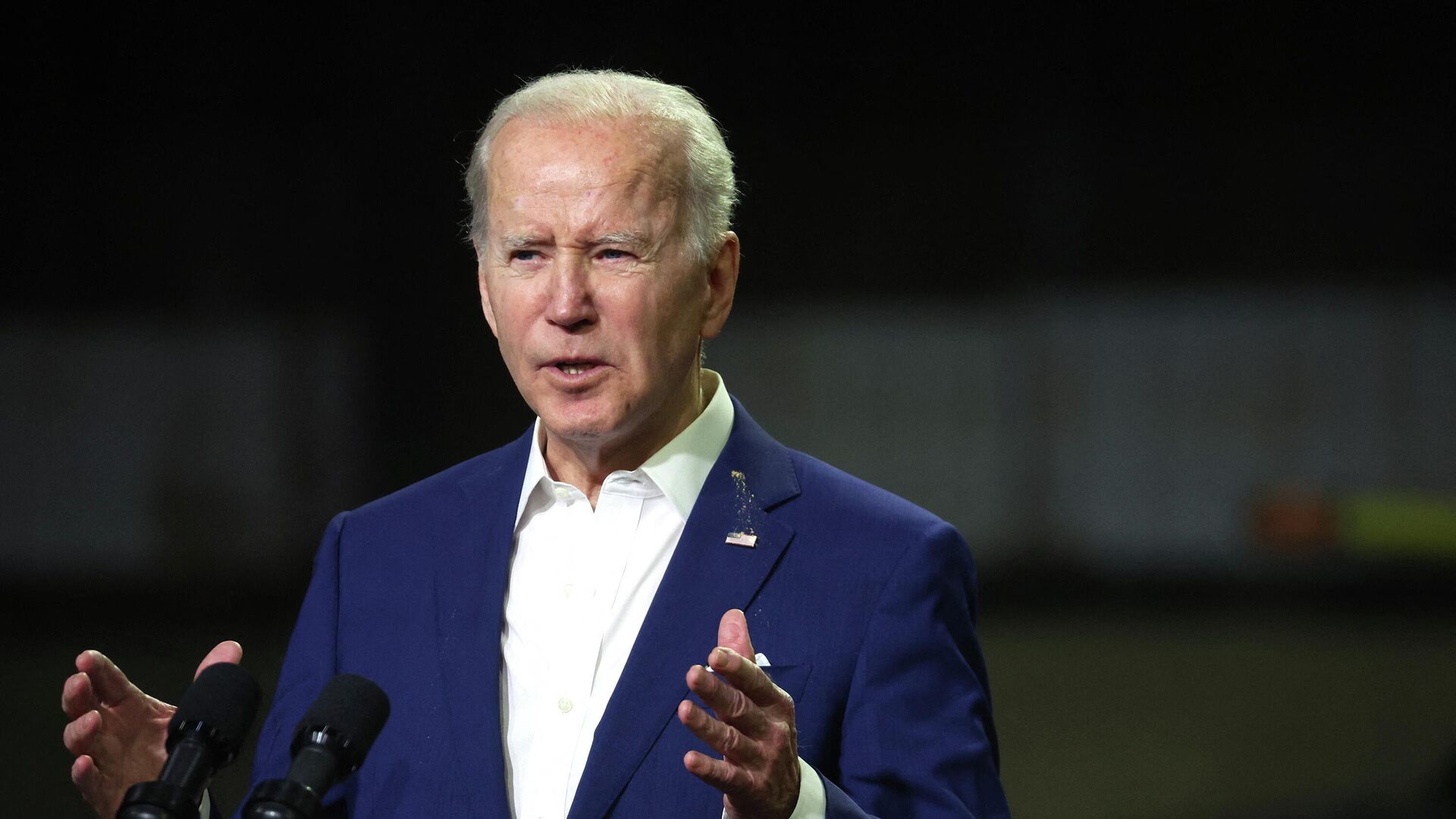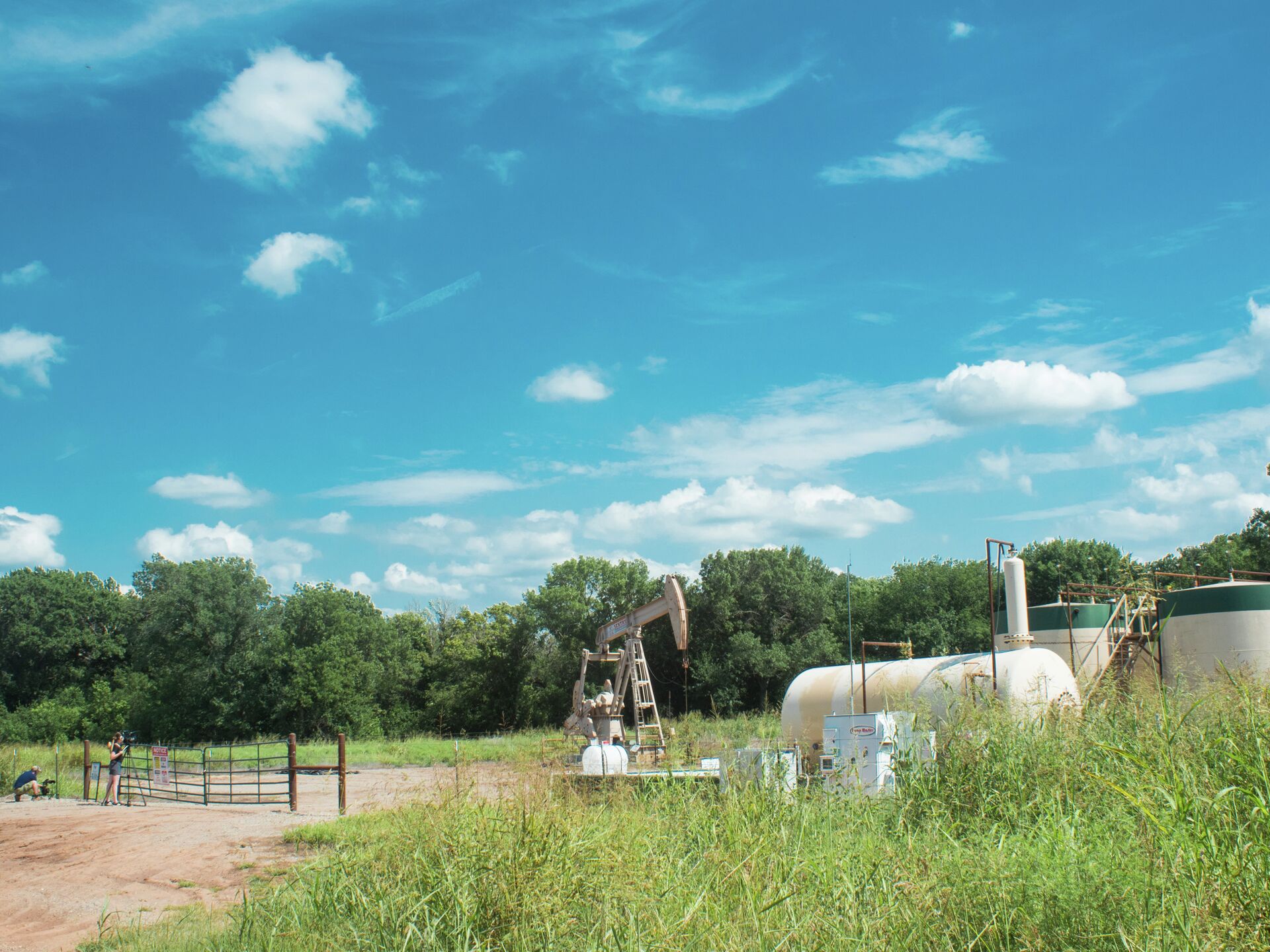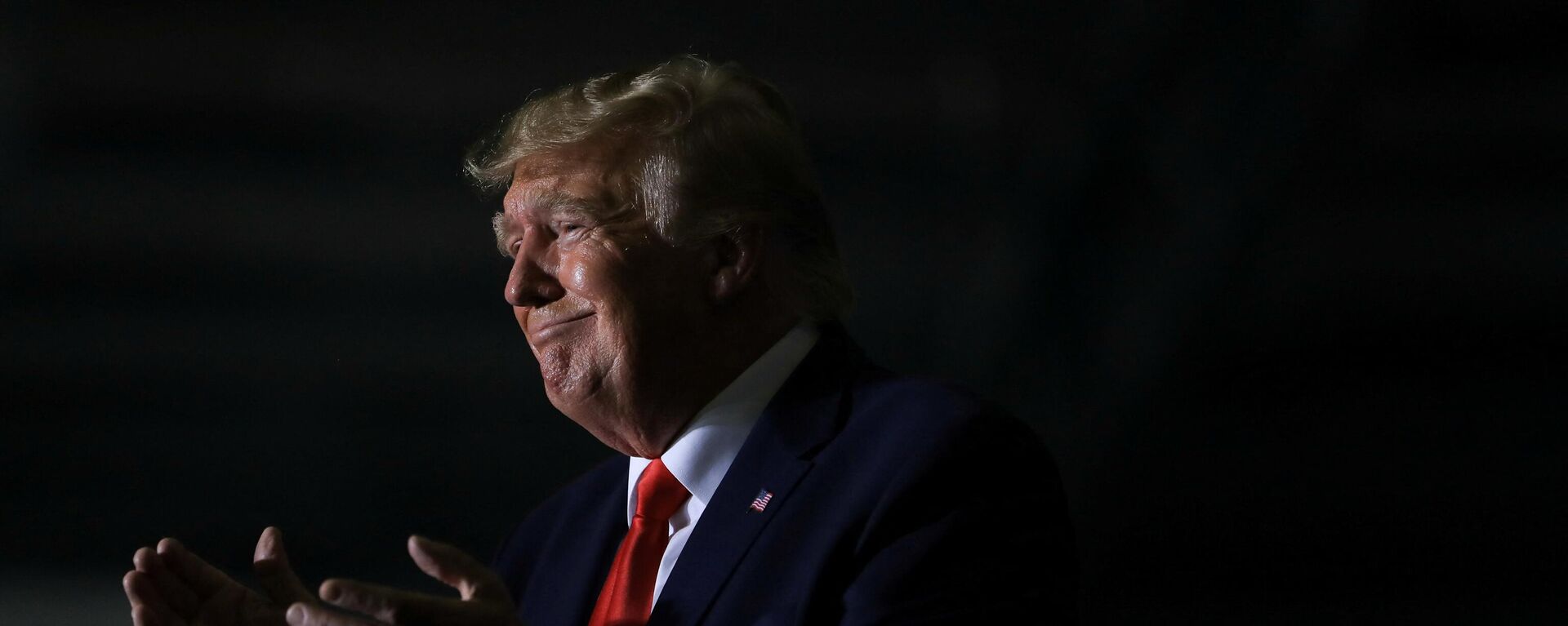https://sputnikglobe.com/20220417/joe-bidens-restrictive-energy-policies-will-compound-problem-amid-crisis-warns-oil--gas-exec-1094833764.html
Joe Biden's Restrictive Energy Policies Will 'Compound Problem'’ Amid Crisis, Warns Oil & Gas Exec
Joe Biden's Restrictive Energy Policies Will 'Compound Problem'’ Amid Crisis, Warns Oil & Gas Exec
Sputnik International
US President Joe Biden has faced growing criticism from Republicans and other Biden detractors who claim his restrictive energy policies since taking office... 17.04.2022, Sputnik International
2022-04-17T13:36+0000
2022-04-17T13:36+0000
2022-11-15T14:20+0000
russia's special operation in ukraine
us
joe biden
sanctions
russia
ukraine
gas
oil
https://cdn1.img.sputnikglobe.com/img/07e6/04/0d/1094729415_0:0:3001:1688_1920x0_80_0_0_4a2228ab3ed8c0cfdf2da93504f6a147.jpg
The Biden administration’s energy policies will ultimately serve to aggravate the oil crisis, an expert has warned.The incumbent POTUS has failed to take much-needed measures to boost production, said US Oil and Gas Association President Tim Stewart as he appeared on "Cavuto Live" on Saturday.The oil and gas expert was weighing in on plans announced by the Interior Department on Friday to hold its first onshore oil and gas lease sales since the Democrat president took office.Deb Haaland, US secretary of interior, revealed plans to open approximately 144,000 acres (225 sq. miles; 580 sq. kilometres) up for lease next week. It was also stated that the department would be charging oil and gas companies higher royalties to drill on federal land. Thus, royalty rates would rise to 18.75 percent from 12.5 percent for oil and gas lease sales.A report issued by the department last autumn urged royalty fees to be brought more in line with the higher rates charged by most private landowners, as well as leading oil and gas producing states.The parcels of land represent about 30 percent less than officials had proposed for sale last November and about 80 percent less than originally sought by the industry. The sales notices are to cover leasing in nine states - Wyoming, Colorado, Utah, New Mexico, Montana, Alabama, Nevada, North Dakota, and Oklahoma.At the same time, he pointed to the fact the measure was far off the mark, adding that “we're only going to have access to about 20% of the current acreage that we have put forward to the secretary as potential oil and gas opportunities for us”.“The Secretary's actions that she announced yesterday will push this problem out three, five, seven, 10 years”, Tim Stewart believed.Biden Pressured Over Energy CrisisThe Joe Biden administration has faced the challenge of bringing down the soaring price of fuel, driven by factors such as the post-pandemic demands and the Western countries’ scramble to slap sanctions on Russia, by expanding US crude production.Under the anti-Russia campaign, the United States banned oil imports from Russia and has since been struggling to mitigate the consequences of its own actions.In March, Biden announced plans to release one million barrels daily from the US strategic oil reserves to “ease the pain families are feeling right now” at the fuel pumps.The POTUS has been persistently shifting responsibility for inflation onto the Russian government, even dubbing the surging fuel costs “Putin’s rise in prices”.Meanwhile, his own Democratic Party has also been calling for more to be done to curb emissions from fossil fuels. But the government’s efforts have had a negligible effect so far on energy prices.A barrel of crude remains at around $100 a barrel, and a gallon of gasoline fetches about $4.20 on average.The GOP and other Biden critics claim that ever since he took office, his actions, such as cancelling the Keystone pipeline, suspending new federal oil and gas leases, hiking up drilling fees on federal land, and a Dem-led push for climate change policies, have alienated US producers.US oil explorers have blamed Joe Biden for suppressing investments in the industry under his anti-fossil fuel agenda, according to Bloomberg.Meanwhile, the Gulf economies have also snubbed Biden’s repeated requests to increase crude production.Thus, the United Arab Emirates (UAE) and Saudi Arabia pointed to security concerns that they believe Washington has failed to address. Abu Dhabi has been disenchanted by the US failure to reinstate a terrorism designation on Yemen's Houthi group after it launched attacks on their hydrocarbon infrastructure. The Gulf monarchies have also bridled at the White House's attempts to revive the Iran nuclear deal (JCPOA).
https://sputnikglobe.com/20220410/trump-says-biden-sent-gas-prices-soaring-long-before-ukraine-crisis-1094628960.html
https://sputnikglobe.com/20220308/scholars-us-ban-on-russian-oil-expected-to-unleash-hell-on-consumers--upend-dems-election-odds-1093698015.html
https://sputnikglobe.com/20220401/chickens-have-come-home-to-roost-why-bidens-spr-release-unlikely-to-curb-oil-prices-1094400491.html
ukraine
Sputnik International
feedback@sputniknews.com
+74956456601
MIA „Rossiya Segodnya“
2022
News
en_EN
Sputnik International
feedback@sputniknews.com
+74956456601
MIA „Rossiya Segodnya“
Sputnik International
feedback@sputniknews.com
+74956456601
MIA „Rossiya Segodnya“
us, joe biden, sanctions, ukraine, gas, oil
us, joe biden, sanctions, ukraine, gas, oil
Joe Biden's Restrictive Energy Policies Will 'Compound Problem'’ Amid Crisis, Warns Oil & Gas Exec
13:36 GMT 17.04.2022 (Updated: 14:20 GMT 15.11.2022) US President Joe Biden has faced growing criticism from Republicans and other Biden detractors who claim his restrictive energy policies since taking office have resulted in American firms having less incentive to produce more oil amid pressure on the energy markets.
The Biden administration’s
energy policies will ultimately serve to aggravate the oil crisis, an expert has warned.
The incumbent POTUS has failed to take much-needed measures to boost production, said US Oil and Gas Association President Tim Stewart as he appeared on "Cavuto Live" on Saturday.
“It goes to this fundamental question of when we're in a crisis like this, is this policy, will it do anything to increase production? And the answer is no…actually it will compound the problem”, stated Stewart.
The oil and gas expert was weighing in on plans
announced by the Interior Department on Friday to hold its first onshore oil and gas lease sales since the Democrat president took office.
Deb Haaland, US secretary of interior, revealed plans to open approximately 144,000 acres (225 sq. miles; 580 sq. kilometres) up for lease next week. It was also stated that the department would be charging oil and gas companies higher royalties to drill on federal land. Thus, royalty rates would rise to 18.75 percent from 12.5 percent for oil and gas lease sales.
A report issued by the department last autumn urged royalty fees to be brought more in line with the higher rates charged by most private landowners, as well as leading oil and gas producing states.
The parcels of land represent about 30 percent less than officials had proposed for sale last November and about 80 percent less than originally sought by the industry. The sales
notices are to cover leasing in nine states - Wyoming, Colorado, Utah, New Mexico, Montana, Alabama, Nevada, North Dakota, and Oklahoma.
“I realize that the Secretary of Interior is very much on message with the rest of the Biden administration…which is we all pay 50% more for 80% less…she was very clear that's what she was going to do for those oil and gas operators who were interested in doing work on federal lands, that we should be prepared to pay about 50% more in royalties and other fees that we already pay”, said Stewart.
At the same time, he pointed to the fact the measure was far off the mark, adding that “we're only going to have access to about 20% of the current acreage that we have put forward to the secretary as potential oil and gas opportunities for us”.
“The Secretary's actions that she announced yesterday will push this problem out three, five, seven, 10 years”, Tim Stewart believed.
Biden Pressured Over Energy Crisis
The Joe Biden administration has faced the challenge of bringing down the soaring price of fuel, driven by factors such as the post-pandemic demands and the Western countries’ scramble to slap sanctions on Russia, by expanding US crude production.
Under the anti-Russia campaign, the United States banned oil imports from Russia and has since been struggling to mitigate the consequences of its own actions.
In March, Biden announced plans to release one million barrels daily from the US strategic oil reserves to “ease the pain families are feeling right now” at the fuel pumps.
The POTUS has been persistently
shifting responsibility for inflation onto the Russian government, even dubbing the surging fuel costs “Putin’s rise in prices”.
Meanwhile, his own Democratic Party has also been calling for more to be done to curb emissions from fossil fuels. But the government’s efforts have had a negligible effect so far on energy prices.
A barrel of crude remains at around $100 a barrel, and a gallon of gasoline fetches about $4.20 on average.
The GOP and other Biden critics claim that ever since he took office, his actions, such as cancelling the Keystone pipeline, suspending new federal oil and gas leases, hiking up drilling fees on federal land, and a Dem-led push for climate change policies, have alienated US producers.
US oil explorers have blamed Joe Biden for suppressing investments in the industry under his anti-fossil fuel agenda, according to Bloomberg.
“You’ve got diplomacy on Ukraine. You’ve got diplomacy with Iran. Now you’ve got diplomacy with Venezuela. You know, it might be advisable to have some diplomacy with oil and gas companies”, Tom Kloza, the global head of energy analysis for OPIS (Oil Price Information Service), was cited as saying.
Meanwhile, the Gulf economies have also snubbed Biden’s repeated requests to increase crude production.
Thus, the United Arab Emirates (UAE) and Saudi Arabia pointed to security concerns that they believe Washington has failed to address.
Abu Dhabi has been disenchanted by the US failure to reinstate a terrorism designation on Yemen's Houthi group after it launched attacks on their hydrocarbon infrastructure. The Gulf monarchies have also bridled at the White House's attempts to revive the
Iran nuclear deal (JCPOA).






